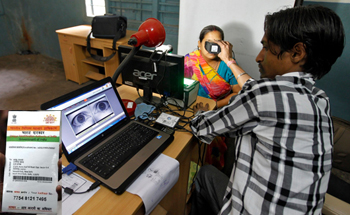New Delhi, Aug 11: Aadhar card will be optional for availing various welfare schemes of the government, the Supreme Court today said and ordered that no personal information of the holders of such cards shall be shared by any authority.
 A three-judge bench, which in the forenoon referred to a larger Constitution Bench a batch of petitions challenging the Aadhar scheme and the issue whether right to privacy is a fundamental right, recorded the statement of Attorney General Mukul Rohatgi that "no personal information of Aadhar card shall be shared by any authority".
A three-judge bench, which in the forenoon referred to a larger Constitution Bench a batch of petitions challenging the Aadhar scheme and the issue whether right to privacy is a fundamental right, recorded the statement of Attorney General Mukul Rohatgi that "no personal information of Aadhar card shall be shared by any authority".
The bench, headed by Justice J Chelameswar, which issued a slew of directions, said the Centre shall give wide publicity through electronic and print media that the card is not mandatory to avail the government schemes.
The bench, also comprising Justices S A Bobde and C Nagappan, said, "UIDAI/Aadhar will not be used for any other purposes except PDS, kerosene and LPG distribution system." However, the court made it clear that even for PDS, kerosene and LPG distribution system, the card will not be mandatory.
It directed that the information received by UIDAI shall not be used for any other purposes, except in criminal investigation with the permission of the court.
The court did not allow the interim plea of petitioners, challenging Aadhar scheme, that the ongoing enrolment process for the Aadhar card be stayed.
Earlier in the day, the apex court had referred to a Constitution Bench the batch of petitions challenging the Centre's Aadhar card scheme and decide whether right to privacy is a fundamental right.
Allowing the Centre's plea, the court framed various questions, including as to whether right to privacy is a fundamental right, to be decided by a Constitution Bench.
"If yes, then what would be contours of the right to privacy," the apex court said while referring the matter to Chief Justice H L Dattu for setting up the larger bench.
Attorney General Rohatgi, appearing for the Centre, had earlier said that the matter requires elaborate debate and an authoritative pronouncement is needed in view of the fact that there have been inconsistent decisions as to whether right to privacy is a fundamental right.
He had cited two judgments, pronounced by six and eight- judge benches, which had held that right to privacy is not a fundamental right.
Subsequently, smaller benches had held a contrary view and, hence this matter needed to be decided by a larger bench, he had said.
"Whether right to privacy is a fundamental right guaranteed under Part III of the Constitution of India, in the light of express ratio to the contrary by an eight-judge bench in M P Sharma case and also by a six-judge bench of this court in Kharak Singh's case" has to be decided, Rohtagi had said.
The Centre had sought transfer of the pleas against Aadhar to a larger bench, saying that a two-judge or a three- judge bench cannot decide it. Referring to pronouncements made in historic cases like A K Gopalan, Maneka Gandhi and bank nationalisation, the top law officer had said that inconsistencies with regard to interpretation of certain fundamental rights can only be "squared up" by a larger bench





Comments
Add new comment